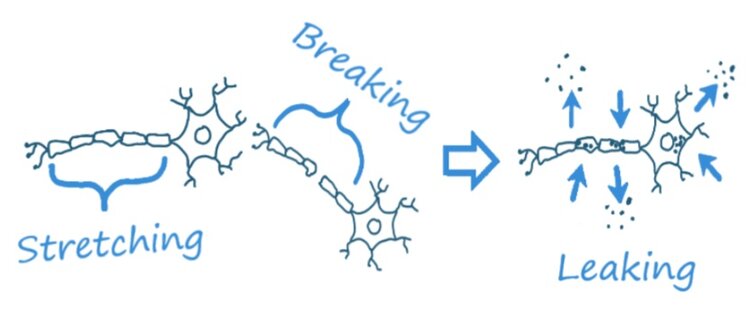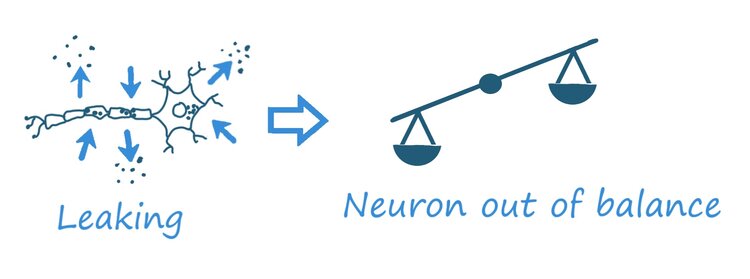What is a concussion?
Concussions are also known as mild traumatic brain injuries (TBI). Concussions are an injury to the brain that is caused by a blow or jolt to the head. They can also be caused by a blow to the body that causes the head to move/ shift quickly which in turn causes the brain to shift quickly inside the skull. Due to this shift, there is a disruption to normal brain functioning. The main point is that during the rapid shifting of the brain, neurons are injured due to them being stretched and can potentially be broken. Concussions are more likely to occur in females, as they have smaller, more breakable nerve fibers.
What happens to the brain during a concussion (mild TBI)?
 Ionic flux
Ionic flux
-
- Potassium going out, sodium going in → membrane permeability starts to have
problems due to the mild TBI - Membrane permeability
 becomes “leaky”: notice images to the right
becomes “leaky”: notice images to the right
- Potassium going out, sodium going in → membrane permeability starts to have
-
- Glutamate release → NMDA receptor
-
- Excess glutamate release means more glutamate binding to its receptors
-
- ATP usage increases via excess glycolysis
- Injuries to the neurons causes chemicals to leak in and out of the cells
- When the membrane permeability is “leaky” → attempting to reestablish all the proper concentration gradients
- The chemical leaks destabilize the neurons away from their typical state → Large amounts of ATP are required in order to reestablish the proper concentrations gradients
- Energy crisis
- Mitochondria is stressed out and overworked due to dealing with all of the excess calcium so ATP is diminished
- ROS increases
- Diminished blood flow to this part of the brain due to energy crisis
- Mitochondria is stressed out and overworked due to dealing with all of the excess calcium so ATP is diminished
- Proteasome activation
- Calcium also increases proteasome activation → proteasomes help to break down proteins
- When cell in a stressed place, it begins the breakdown of things that should not be broken down to begin with
- There is cytoskeletal damage
- Inflammation
- Upregulation of cytokines trying to fix some of the damage
- Axonal dysfunction
- Calcium also increases proteasome activation → proteasomes help to break down proteins
Symptoms of concussion:
- Migraine
- Decreased reaction time
- Slow cognition
- Memory impairment
- vulnerability to repeated injury
- Hippocampus and cerebral decrease
- Changes in protein degradation
- Chronic atrophy
Treatment options:
- Relative rest
- Physical rest; recommended for two days after concussion
- Mental rest; recommended for two days after concussion
- Complete rest
- It is important to note that complete rest (such as very low stimulation areas; dark room with little to no brain stimulation) is not recommended
- Avoid physical activity
- When returning to complete activity
- Add activities back into daily life routine gradually
- Medications
- Tylenol is recommended during concussions for any pain relief necessary
- Ibuprofen and Advil are not advised as they do increase bleeding
Sources:
Giza, C. C., & Hovda, D. A. (2014). The New Neurometabolic Cascade of Concussion. Congress of Neurological Surgeons.
Mayo Foundation for Medical Education and Research. (2020, February 22). Concussion. Mayo Clinic. Retrieved November 14, 2021, from https://www.mayoclinic.org/diseases-conditions/concussion/diagnosis-treatment/drc-203
Sandel , E. (Ed.). (n.d.). What happens to your brain when you get a concussion? Concussion Alliance. Retrieved November 14, 2021, from https://www.concussionalliance.org/what-happens-to-your-brain.
